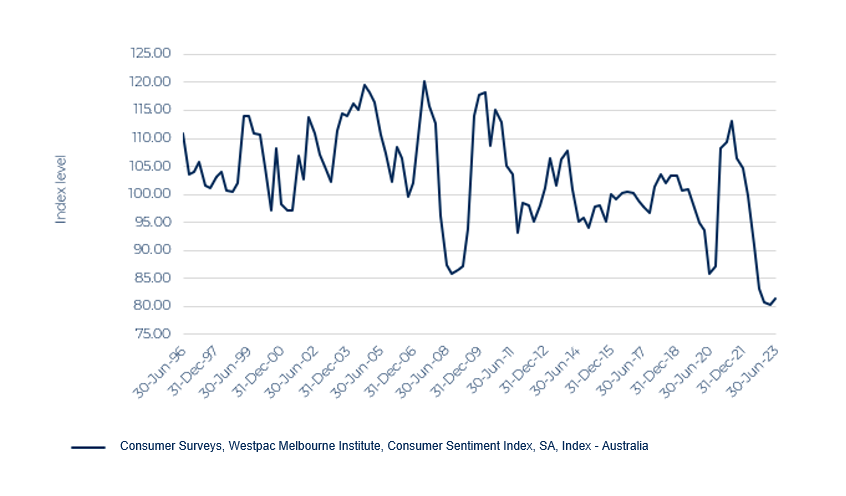In the June 2023 Perpetual Private Quarterly Market Update we look at the forces replacing the pandemic and interest rates as key market movers. You can download our full report – or read our concise review below.
Please note: except where otherwise noted or quoted, the views in this article are those of Perpetual Private’s investment team.
June Quarter 2023: What happened?
- Despite sticky inflation, more rate rises and an attritional war in Ukraine, share market investors celebrated in June. Global shares were up nearly 7% for the quarter and 20% for the 2023 financial year.
- The local market had a quiet quarter, rising less than 1%. However, over the past year Australian shares handed investors a 14% return.
- Technology stocks rebounded, with the NASDAQ up 13% for the quarter and over 30% for the year. Enthusiasm for the productivity potential of AI fuelled the tech revival.
- Bond markets were weak with global bonds down 0.30% for the quarter and around 1% for the year. Local fixed income was down nearly 3% for the quarter and up just over 1% for the year.
(Indices referenced: MSCI AC World, S&P/ASX 300, Bloomberg Global Aggregate index, Bloomberg AusBond Composite (0+Y) index. All performance numbers to end June 2023 quarter unless otherwise stated).
“The consumer is always right” Harry Gordon Selfridge
Since the start of 2020, the investment landscape has been painted by big themes: Covid lockdowns, Ukraine, inflation and rising interest rates. Halfway through 2023 that picture is sharpening. The outlook for markets may now depend on decisions in Main Street, not Martin Place.
Therapeutic retail
Until relatively recently, consumers ignored the ladder-climb of interest rates around the globe and kept spending.
What’s behind that consumer resilience? Some of it is human nature. After two years where purses were pursed and wallets wedged closed, consumers went shopping for flights and flew into shopping centres.
Much of it is taxpayer funds. Governments effectively bribed people to stay locked down and with nowhere to spend that money, consumers entered the rate tightening cycle laden with cash.
According to Perpetual Private Investment Director, Andrew Garrett, US consumers have approximately $US500 billion in excess savings. That’s a big number. But it’s down 80% in the past 18 months. “As those stimulus savings burn down, we’re watching the consumer carefully,” says Andrew Garrett.
|
Figure 1. Consumer health – Consumer sentiment |

“In large, modern economies like the US and Australia, consumer spending is a major element of economic activity,” says Andrew Garrett. “So falling consumer sentiment shows up in weaker corporate balance sheets and, eventually, stock market performance.”
Digging for decarbonisation
Of course, consumer sentiment is not the only force that will move markets for the rest of 2023 and beyond. The popularity of ChatGPT (the most rapidly adopted consumer app in history) will catch the headlines, but the power of AI could reshape productivity and unleash new avenues for economic growth.
In the ESG sector, we’re also seeing a movement away from simple themes – like screening out environmentally damaging companies - to more nuanced ideas.
As Andrew Garrett explains in the video above, there’s an increasing focus on the importance of minerals like lithium, copper and rare earths to the decarbonisation of the global economy. According to McKinsey, Tesla alone will need an annual 1,000 kilotons of lithium carbonate equivalent by 2030. That’s 30% more than current global production[1]. Copper miners will need to increase their processing by 44% by 2031 to meet the demands of decarbonisation.[2]
A recent academic[3] paper challenged sustainable investors to look beyond a company’s headline, percentage reduction in emissions and to engage with and invest in so-called ‘brown’ companies that can use that investor capital to make a sizeable absolute cut in emissions.
Juggling investment priorities
Over the next year the forces driving markets are likely to multiply. The interest rate environment will still be crucial. But so will geopolitics, consumer sentiment, technological change and the shift to decarbonisation. So how do portfolio managers deal with these variegated challenges?
“One of the advantages we have is our use of specialist fund managers,” says Andrew Garrett. “Whether they’re ESG experts, specialists in fixed income, technology or emerging markets, they’re close to the action, close to the facts as they evolve. And that means we’re making investment decisions that are information rich.”
Perpetual Private’s investment methodology combines those bottom-up insights with the risk-management benefits of diversification and strategic portfolio construction. The argument for that approach was best put by its architect, Nobel Prize winner, Harry Markovitz, who died in June.
“A good portfolio is more than a long list of good stocks and bonds” said Markovitz. “It is a balanced whole, providing the investor with protections and opportunities with respect to a wide range of contingencies.”
Perpetual Private’s Quarterly Investment Update for June 2023 covers the changing nature of investment dynamics and looks at the outlook for shares, fixed income, real estate, currency and alternatives.
[1] Australia’s potential in the lithium market, June 9, 2023, McKinsey & Co article
[2] Bridging the copper supply gap, February 17, 2023, McKinsey & Co article
[3] Counterproductive sustainable investing: The impact elasticity of brown and green firms, Samuel M. Hartzmark, Kelly Shue, July 2023. See also https://www.livewiremarkets.com/wires/this-investment-theme-is-broken-with-us-34-trillion-on-the-line.